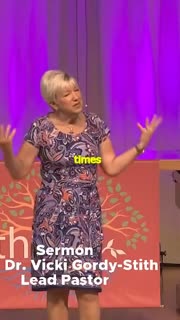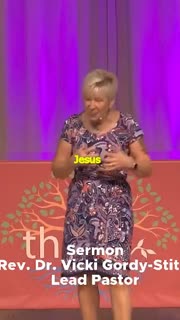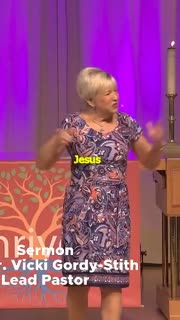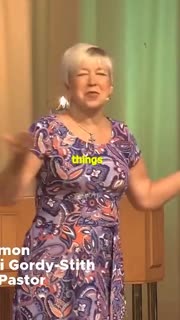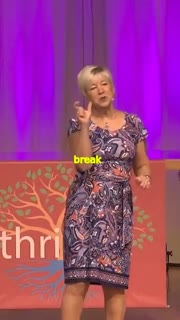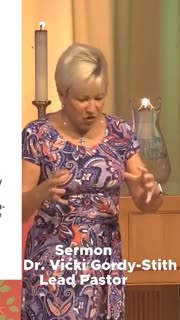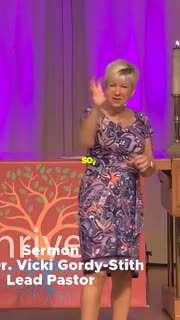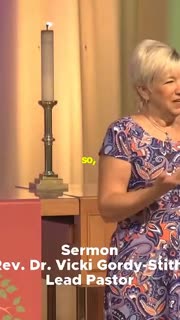Embodying Peace: Remember, Repair, and Reconnect
Devotional
Sermon Summary
Bible Study Guide
Sermon Clips
### Quotes for Outreach
1. "Remembering times when we weren't at peace with another person, remembering times when we were othered, when we were not seen as part of the in-group, remembering times when we participated in an act of violence, whether that was words or, you know, other ways of being violent. So, remembering, it's a matter of remembering who we are as God's children, but also remembering who we are as people who are capable of sin, of evil." [58:24] (35 seconds)
2. "Jesus came to repair those relationships. To repair our relationship with God. Sometimes it's called reconciliation, but I love the word repair because repair looks at that break in relationship as a wound instead of as, you know, something to be judged. It's something to be healed." [01:00:01] (23 seconds)
3. "When Jesus died, he completely broke that cycle of violence, because there was sin, and there was violence, and there was no vengeance. In fact, his death actually led to life. And so, he invites us to a different kind of cycle, a cycle of sin and violence, and then what he calls, or what the Scripture in Ephesians especially calls righteousness, and then peace." [01:03:25] (35 seconds)
4. "One of the things I love about United Methodist theology is that we believe salvation is a process, that yes, God loves us even before we know who God is. And we call that prevenient grace. It's why we baptize babies. And then there's a moment in our lives when we're like, oh my gosh, Jesus loves me. I can be repaired. My heart can be set free." [01:05:13] (28 seconds)
5. "When you break the word down into its Latin roots, re-meaning, again, right, and legate, there, meaning to bind or to connect, it means reconnecting the body, putting things together again. And that's what those final verses are talking about, is that, you know, there was a temple that Gentiles were not allowed into that, by the way, was destroyed in AD 70 and has not been rebuilt." [01:06:47] (32 seconds)
### Quotes for Members
1. "We can't achieve peace through violence. It will never work. so I know, even as your heart is breaking, our heart joins yours, in longing that your presence would come into our country, and would allow us to sense that peace, and to practice that peace. So that one day we would honor one another, even in our differences." [12:15] (32 seconds)
2. "And so, you know, there was tension in the room, but there was respect, you know? Everyone was, you know, we were expressing our different opinions and yet there was a sense of trying to listen to one another. And there was a turning point when someone said to West Virginia, I mean to New England, will this work for you? And they stopped. And they said, did you just ask us if that will work? And we said yes." [54:56] (32 seconds)
3. "And so, breaking it down is painful. And yet, until we allow Jesus to do that work of helping us to see what needs to be taken apart in our own lives, we're never going to get to that place of repair. And so, that's an important piece of it, allowing Christ to break down those walls of hostility in our hearts." [01:01:37] (25 seconds)
4. "And so, Jesus' death interrupted that cycle, and instead replaced it with a new one. But that requires us to work, that process of peace. Yes, Jesus brought peace, but we have to participate in that process, and we have to practice it." [01:03:25] (20 seconds)
5. "And when we know and remember who we are and who we could be, we find this taste of peace. And it's something that is just going to be living into. We're never going to get to it until Christ comes again. But it's something that we get to experience, just a little taste, and that makes all the difference in the world." [01:08:38] (25 seconds)
Ask a question about this sermon
1. "Remembering times when we weren't at peace with another person, remembering times when we were othered, when we were not seen as part of the in-group, remembering times when we participated in an act of violence, whether that was words or, you know, other ways of being violent. So, remembering, it's a matter of remembering who we are as God's children, but also remembering who we are as people who are capable of sin, of evil." [58:24] (35 seconds)
2. "Jesus came to repair those relationships. To repair our relationship with God. Sometimes it's called reconciliation, but I love the word repair because repair looks at that break in relationship as a wound instead of as, you know, something to be judged. It's something to be healed." [01:00:01] (23 seconds)
3. "When Jesus died, he completely broke that cycle of violence, because there was sin, and there was violence, and there was no vengeance. In fact, his death actually led to life. And so, he invites us to a different kind of cycle, a cycle of sin and violence, and then what he calls, or what the Scripture in Ephesians especially calls righteousness, and then peace." [01:03:25] (35 seconds)
4. "One of the things I love about United Methodist theology is that we believe salvation is a process, that yes, God loves us even before we know who God is. And we call that prevenient grace. It's why we baptize babies. And then there's a moment in our lives when we're like, oh my gosh, Jesus loves me. I can be repaired. My heart can be set free." [01:05:13] (28 seconds)
5. "When you break the word down into its Latin roots, re-meaning, again, right, and legate, there, meaning to bind or to connect, it means reconnecting the body, putting things together again. And that's what those final verses are talking about, is that, you know, there was a temple that Gentiles were not allowed into that, by the way, was destroyed in AD 70 and has not been rebuilt." [01:06:47] (32 seconds)
### Quotes for Members
1. "We can't achieve peace through violence. It will never work. so I know, even as your heart is breaking, our heart joins yours, in longing that your presence would come into our country, and would allow us to sense that peace, and to practice that peace. So that one day we would honor one another, even in our differences." [12:15] (32 seconds)
2. "And so, you know, there was tension in the room, but there was respect, you know? Everyone was, you know, we were expressing our different opinions and yet there was a sense of trying to listen to one another. And there was a turning point when someone said to West Virginia, I mean to New England, will this work for you? And they stopped. And they said, did you just ask us if that will work? And we said yes." [54:56] (32 seconds)
3. "And so, breaking it down is painful. And yet, until we allow Jesus to do that work of helping us to see what needs to be taken apart in our own lives, we're never going to get to that place of repair. And so, that's an important piece of it, allowing Christ to break down those walls of hostility in our hearts." [01:01:37] (25 seconds)
4. "And so, Jesus' death interrupted that cycle, and instead replaced it with a new one. But that requires us to work, that process of peace. Yes, Jesus brought peace, but we have to participate in that process, and we have to practice it." [01:03:25] (20 seconds)
5. "And when we know and remember who we are and who we could be, we find this taste of peace. And it's something that is just going to be living into. We're never going to get to it until Christ comes again. But it's something that we get to experience, just a little taste, and that makes all the difference in the world." [01:08:38] (25 seconds)
